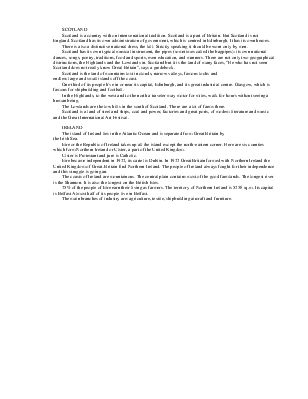

GREAT BRITAIN
The United Kingdom of Great Britain and Northern Ireland consists of England, Wales, Scotland and Northern Ireland. It lies on the British Isles which are to the west of the continent of Europe. Great Britain and Ireland are the largest islands and there are about 5,000 small ones. The territory of Great Britain is 244 100 square kilometres.
The North Sea
and the English Channel (the narrowest part of which is called the Strait of
Dover) separate Great Britain from the continent. The Irish Sea separates Great
Britain from Ireland
There are many rivers in Great Britain, but they are not very long. The Severn in Wales and Shannon in Ireland are the largest rivers. The Thames is the busiest and the most important river in England. This river is more than 200 miles long. England, Ireland and Scotland have many beautiful lakes, the most famous of which are in the Lake District.
The climate of Great Britain is mild. The weather is greatly influenced by the wind that blows from the sea So it is cooler in summer and warmer in winter here than in most other countries of Northern Europe.
There is much rain and fog in autumn and in winter. October is often the rainiest month of the year. February is the coldest month in Great Britain, though snow does not lie on the ground for long.
Great Britain has a population of 55,676,000. It is one of the most densely populated countries in the world. The average density is about 228 people per square kilometre. About 80 per cent live in towns.
The surface of the British Isles varies very much. The north of Scotland is mountainous and is called the Highlands. The south is called the Lowlands. It has many beautiful valleys. There are many lakes in Scotland and they are called Lochs. The north and west of England are mountainous, but all the rest (east, centre and southeast) is a plain. The mountains in Great Britain are not very high. On die border between England and Scotland there is a range of hills called the Cheviot Hills, The Cumbrian Mountains occupy the greater part of Wales. The Pennines stretch across the centre of Great Britain.
Great Britain is not very rich in mineral resources. The most important mineral resources are iron and coal.
Great Britain is a highly-developed capitalist country. Most of its industries produce iron and steel goods, electronics and machinery, chemicals and textiles. Great Britain lias a highly developed shipbuilding industry.
Great Britain imports all of its oil, cotton, rubber, four-fifth of its wool, half of its food and iron ore.
It exports machinery, motor-cars, locomotives, chemicals, textiles, radio, TV and navigation equipment.
There are a lot of industrial cities in Great Britain. London, Birmingham, Glasgow, Liverpool, Edinburgh, Manchester, Cardiff Sheffield are main of them.
Great Britain is a parliamentary monarchy. According to law the country is govemed by the Parliament consisting of the Queen (or king ) the House of Lords and the House of Commons. In fact the Queen has almost no power in the country. The Parliament consists of two Houses: Die House of Commons having 630 members which are elected every five years and the House of Lords with more than 800 peers.
The Prime-Minister is usually the leader of the party that has a majority in the House of Commons. This party is called the Government, and the other —the Opposition.
There are three
main political parties in Great Britain: the Conservative (or Tory) Party,
the Labour Party and the Liberal Party.
WALES
Wales is a small country, washed in the north and west by the Irish Sea, and in the south by the British Channel. In the east it borders on England.
The total area of Wales is 8,006 square miles and its total population about 2,600,000 compared with an area of 50,237 square miles in England, and a total British population of over 50 million.
There are
rivers, mountains, forests and a lot of farms in the middle of Wales. The
longest rivers are the Wye (130) and the Dee (70 miles). The highest mountain is Snowdon. There are several more lakes and artificial reservoirs, some
of them providing the water supply for Birmingham and Liverpoolin England.
Wales is divided into thirteen countries, but 70% of the population lives
in the three
industrial counties of the south-Glamorgan, Monmouth, Carmarthen
Уважаемый посетитель!
Чтобы распечатать файл, скачайте его (в формате Word).
Ссылка на скачивание - внизу страницы.